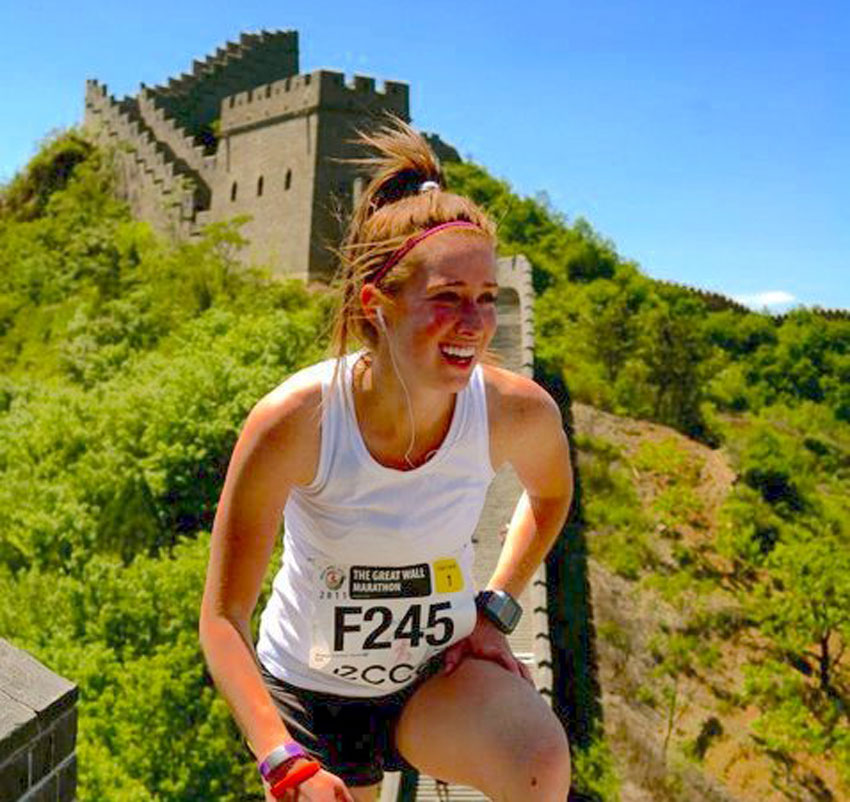Q&A: Nutritionist And Marathon Runner Meghan Hamrock

Image courtesy of Meghan Hamrock
North Carolina transplant Meghan Hamrock is now a Boston-based nutritionist, marathon runner, and Tufts grad. Unlike other diet plans, Hamrock’s approach to nutrition doesn’t focus on cutting out “bad foods.” Instead she helps her clients put together individualized and balanced nutrition plans that work to meet their specific needs. She writes a blog that tracks her weekly running stats, shares nutrition tips, and engages readers in actively making changes in their lifestyles. Hamrock tells us about her unique approach to nutrition and how to rethink bad foods.
What inspired you to become involved in nutrition?
It was during undergrad when I started having several health issues, mainly in regards to my stomach. No doctor could figure out what it was and I eventually got frustrated with all the medications and trials so I gave them all up. It was only a matter of weeks before I realized that it was what I was feeding myself that was causing my problems. The doctors had gravitated toward the treatment approach, but it was the preventative approach that actually helped me. Ever since then, I’ve have this passion and motivation to communicate with people about public health and give them the health and nutrition tools they need to make the right choices for a healthier lifestyle.
What is your approach to nutrition?
I believe we live in a world that puts too much focus on what’s wrong with food and not enough emphasis on what’s good about it. The more we categorize the foods that are bad for you, the more we feel out of control of our diets and our cravings, and the more likely it is that we will fall off the wagon of a balanced diet. For example, do I generally recommend white bread? Not usually. But is it all-around bad? No. I eat white bread as pre-race fuel because it has less fiber so I see it as a good food in that case. My program’s main focus is getting as much real food as possible. Whole foods are foods that have naturally ocurrung nutrients and are not packaged and filled with endless vitamins and minerals.
How does your individualized nutrition program work?
I work with individuals to communicate about their nutrition habits and improve their diets. My program comes with that added follow-up nutrition communication aspect as well. I have found communication about individualized nutrition to be very effective. It was actually my focus in grad school. Whether it be via phone, email, or in person, being held accountable and checking in with me to tell me what is and isn’t working is a key benefit to individualized nutrition.
What is one piece of advice you always give your clients?
That nutrition is truly a commitment. I can tell you what is good to eat and help you alter how you eat, but if you are not willing to also commit to these changes, it is out of my control. It’s a learning process and it’s about a lifestyle change over time, not in one night or even one week. There is not a one-size fits all when it comes to your nutrition.
What is your favorite snack ?
My favorite snack is an apple with peanut butter. Predictable, right? It’s my favorite because its portable and easy. But in my book, anything can be paired with peanut butter for a great snack, I love it.
You’re also a runner. What is your favorite thing about running?
Running is my “me time.” I can try a new route and get lost if I want to. I control how far or how fast I want to go. And I have seen some incredible places on my runs. You really start to pay attention to the details and the little things and appreciate your surroundings when you take a second to look. Most importantly, I just feel better after I run. It’s definitely not a feeling I’m going to give up.
Do you have anything that you dislike or hate about running?
The amount of laundry I do every week, especially in the winter with all the layers. But other than that, I think what I dislike the most about running is the mental game it plays on you. I get so negative when I don’t work out or run. Is it really the end of the world if I miss one day of working out? Probably not, but I feel that way if I do.
What advice can you give other runners who are preparing to run marathons?
Underneath all the fancy gear, and race destinations, and mileage, what you do when you are not running is what makes the difference. Give your nutrition and hydration the attention it needs, listen to your body, take rest days, and just enjoy yourself.
What marathons have you completed and which do you plan to participate in in the future?
I started running marathons in 2011. I have completed 8 marathons in 7 states, and 2 continents. I’ve run in Florida, Boston, Beijing, and California. My goal is to run a marathon in every state and on every continent over the course of my lifetime. I am currently the Race Ambassador for the Asheville Marathon at the Biltmore Estate in Asheville, North Carolina and that will be my next marathon in March.


